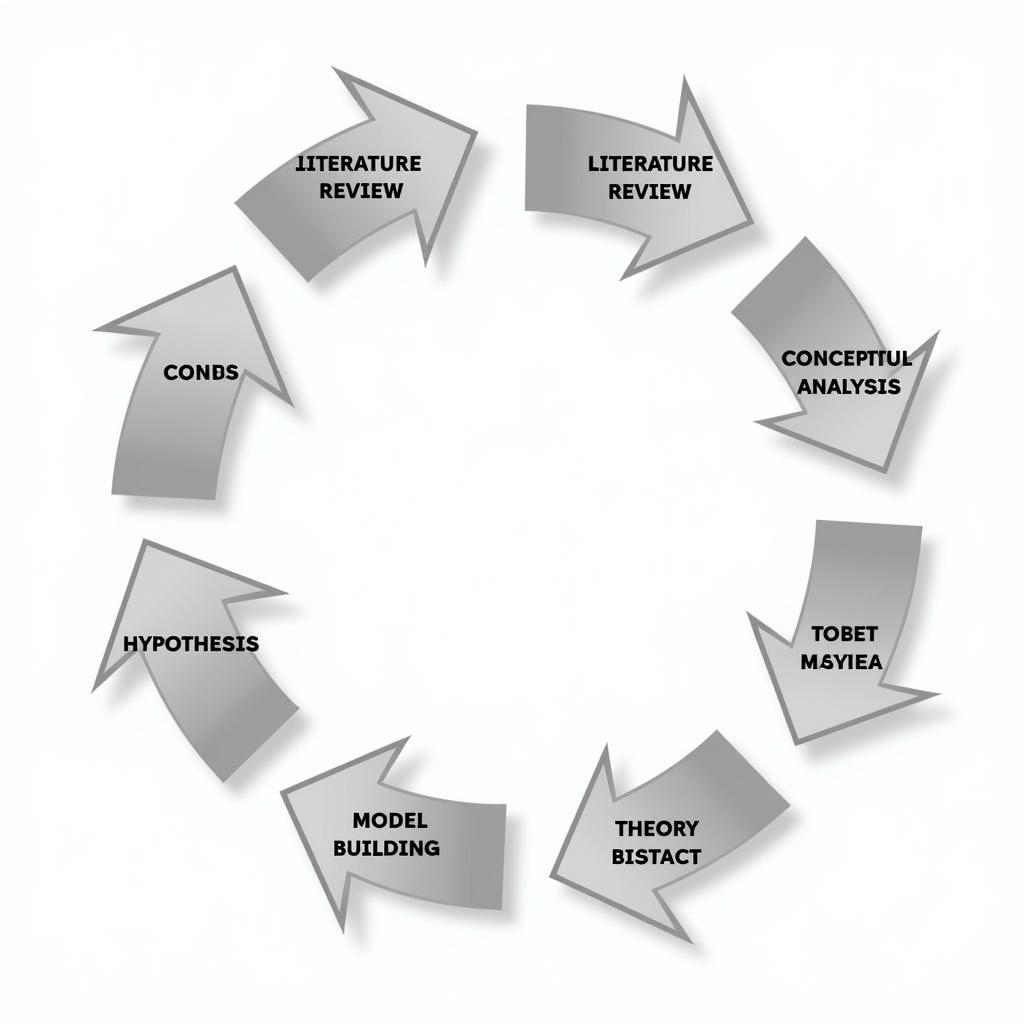Theoretical research delves into the “why” behind phenomena, seeking to explain and predict rather than simply describe. It’s the foundation upon which practical knowledge is built, offering a framework for understanding the complex world around us. But how does it work, and why is it so crucial in fields like paranormal investigation?
Unveiling the Essence of Theoretical Research
Imagine attempting to solve a jigsaw puzzle without the picture on the box. You might be able to fit some pieces together, but without a comprehensive understanding of the overall image, you’d be stumbling in the dark. Theoretical research provides that missing picture, offering a conceptual framework to guide our understanding.
It’s a meticulous process of formulating hypotheses, constructing theories, and refining them through rigorous logical analysis. Unlike empirical research, which relies on direct observation and experimentation, theoretical research explores ideas, concepts, and possibilities within the realm of thought.
 Abstract concept of theoretical research
Abstract concept of theoretical research
Why Theoretical Research Matters in Paranormal Investigation
The paranormal, by its very definition, lies beyond the realm of conventional scientific understanding. It deals with phenomena that often defy easy categorization or explanation through traditional means. This is where theoretical research shines.
By developing comprehensive theories about the nature of consciousness, energy, and the potential for other dimensions, we can begin to formulate testable hypotheses and potentially design experiments that move us closer to unraveling these mysteries.
For example, theoretical research into the nature of consciousness might explore:
- The relationship between consciousness and the physical body: Could consciousness exist independently of the body, as suggested by near-death experiences?
- The possibility of non-local consciousness: Can consciousness interact with other minds or objects across vast distances?
- The nature of psychic abilities: Is it possible for some individuals to tap into hidden potentials of the mind?
These questions might seem abstract, but they form the bedrock upon which meaningful paranormal research can be built.
The Building Blocks of Theoretical Research
While the specific methods used in theoretical research might vary depending on the field of study, several core elements are common to all:
- Literature Review: Before venturing into uncharted territory, it’s essential to understand the existing body of knowledge. This involves examining previous research, relevant theories, and historical perspectives on the chosen topic.
- Conceptual Analysis: This stage involves dissecting complex ideas and concepts, breaking them down into smaller, more manageable components. By clarifying definitions and identifying underlying assumptions, researchers can build a solid foundation for their theories.
- Hypothesis Formation: Based on the insights gained from the literature review and conceptual analysis, researchers formulate testable hypotheses—tentative explanations that can be supported or refuted through further investigation.
- Model Building: In some cases, researchers develop models or frameworks to represent their theories visually. This can involve flowcharts, diagrams, or even mathematical equations that illustrate the relationships between different variables.
- Theory Refinement: Theoretical research is not a static process. As new evidence emerges and our understanding evolves, theories must be constantly refined, adjusted, or even discarded if they no longer align with the available data.
 Cycle of theoretical research
Cycle of theoretical research
Theoretical vs. Empirical Research: A Powerful Partnership
It’s crucial to remember that theoretical research is not intended to replace empirical research. Instead, the two approaches complement and enrich each other, forming a powerful partnership in the quest for knowledge.
Theoretical research provides the framework and direction, while empirical research tests the validity of those theories through observation and experimentation. This interplay between ideas and evidence is what drives scientific progress, pushing the boundaries of what we know and opening new avenues for exploration.
For those intrigued by the world of paranormal research, understanding the distinction between theoretical and empirical approaches is essential. To learn more about empirical research and its role in paranormal investigations, check out our article on theoretical vs empirical research.
The Enduring Power of Theoretical Inquiry
In a world often dominated by the tangible and the immediate, it’s easy to overlook the power of theoretical research. However, it’s precisely through the rigorous exploration of ideas, the relentless pursuit of “why,” that we unlock the deepest mysteries of the universe—both seen and unseen.
By embracing theoretical inquiry alongside empirical investigation, we equip ourselves with the tools needed to navigate the complexities of the paranormal and move closer to a comprehensive understanding of the world beyond our everyday perception.
FAQs About Theoretical Research
1. What are some examples of theoretical research in other fields?
Theoretical research plays a vital role in numerous disciplines. For instance, in physics, Albert Einstein’s theory of relativity revolutionized our understanding of gravity and the universe. In economics, John Maynard Keynes’s work laid the foundation for modern macroeconomics.
2. Is theoretical research only for academics?
Absolutely not! While often associated with academia, theoretical thinking is a valuable skill for anyone seeking to delve deeper into a subject, solve complex problems, or explore new possibilities.
3. How can I contribute to theoretical research in the paranormal field?
Start by exploring existing literature, engaging in critical discussions, and developing your own hypotheses. Don’t be afraid to challenge conventional thinking and explore unconventional ideas.
4. What are some resources for learning more about theoretical research?
University websites, academic journals, and online research databases are great places to start. Additionally, consider connecting with researchers in your field of interest.
5. Is theoretical research always successful?
Like any scientific endeavor, theoretical research involves trial and error. Not every hypothesis will prove correct, and some theories might require significant revisions or even abandonment. However, even “failed” theories can provide valuable insights and pave the way for new discoveries.
Need Help with Your Research?
If you’re interested in delving deeper into theoretical research, exploring specific paranormal phenomena, or need assistance with your own research project, don’t hesitate to reach out. Our team of experienced researchers at Paranormal Research is here to help.
Contact us today:
- Phone: 0904826292
- Email: research@gmail.com
- Address: No. 31, Alley 142/7, P. Phú Viên, Bồ Đề, Long Biên, Hà Nội, Việt Nam
We’re available 24/7 to answer your questions and provide guidance on your journey into the world of the unknown.